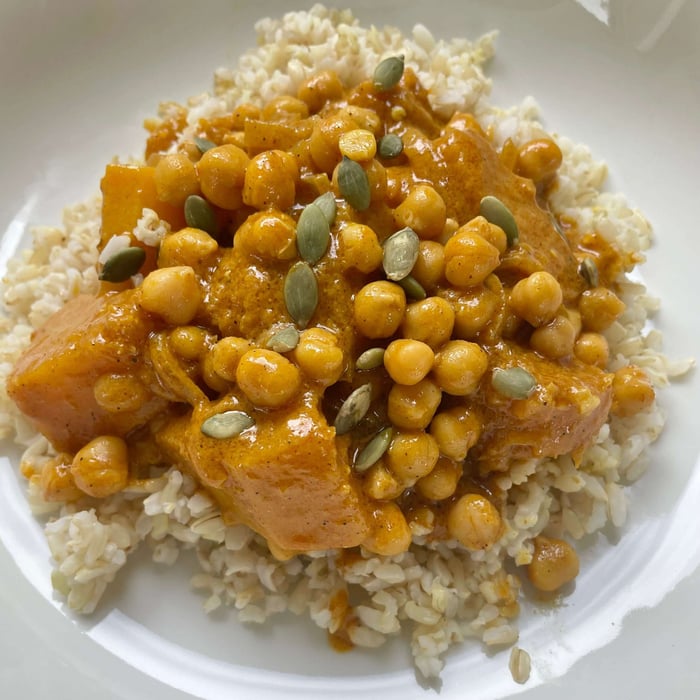Everyone loves the sauce of a butter chicken. This vegetarian butter chicken is a great variation on the classic and enjoyed by kids and adults alike. Unlike the original style recipe, this vegetarian butter chicken recipe uses coconut milk to create the creamy tangy curry sauce. In this vegetarian butter chicken recipe, I have used pumpkin and chickpeas instead of chicken, it works well with many other veggies subbed in along with meat options. This vegetarian butter chicken recipe is a great meal to prep on a Sunday to make some extra lunches for the week ahead. It is full of filling and nourishing ingredients to nourish you during your postpartum period. This makes a delicious and warming postpartum meal with the mix of dry spices and ginger. Enjoy this vegetarian butter chicken recipe with rice, cauli rice, quinoa and green veggies.
Serves 4 with rice.
Ingredients:
4 tbsp extra virgin olive oil
1 brown onion, sliced
4 cloves garlic, crushed
2 cm ginger, grated
2 tsp garam masala
1 tsp ground cardamon
1 tsp ground coriander
1 tsp ground cumin
1 tsp paprika
1 tsp turmeric
1/2 tsp chilli flakes (optional)
3 tbsp tomato paste
2 tbsp lemon juice
1 tsp sea salt
1 x 400ml can coconut milk
1/2 a butternut pumpkin (approx. 700g)
1 x 400g can chickpeas, drained and rinsed
brown rice to serve.
Method:
Heat the oil in a large pot over the heat.
Add the onion and cook gently until soft. Add the garlic, ginger and spices and stir gently until fragrant (1-2 mins).
Stir in the tomato paste and cook for 1 minute. Add the lemon juice, salt and coconut milk.
Add in pumpkin, bring to the boil and then reduce to simmer with lid on for 20-25 mins until the pumpkin is cooked through but not mushy.
Remove the lid and stir through the chickpeas until heated through.
Serve with rice of choice and garnish with fresh coriander leaves or pumpkin seeds.
We have a great flatbreads recipe that would make a great accompaniment. Find the recipe here.
Chickpeas - A delicious plantbased source of protein and micronutrients such as iron and B vitamins. The addition of legumes to any meal provides many health benefits; being rich in fibre they fuel the microbiome, reduce inflammation, limit cholesterol absorption and support blood glucose control.

